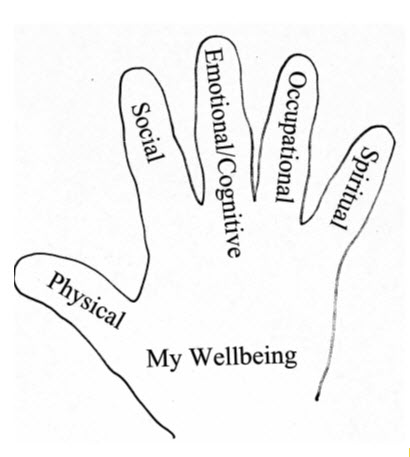Here are 3 steps to building your self-care plan.
1. Get the big picture. 2. Start small. 3. Pick your intentions.
1. Get the big picture
Learn the major components of well-being. An example of this is THE BASICS: Strategies for Coping with Stress and Building Personal Resilience for Physicians by the Ontario Medical Association.
The checklist helps you consider the categories you wish to address in your plan.
Even more succinct is the hand diagram below. Each finger represents an important element of who we are, which needs to be taken care of. Your self-care plan needs observable self-care activities for each finger.

2. Start small.
You may be doing some of these self-care activities already. Great start! Pick 1-2 items from each category in the BASICS check list above or from other resources on self-care behavior and convert them into daily or weekly
observable
self-care
activities (OSCAs). This means the activity is specific, measurable, attainable, realistic and time-bound.
For example, under the physical self-care section you might pick a goal to maintain hydration. The observable self-care activity (OSCA) could be: Drink one full 16 ounce container of water through the day. It's specific (water), it's measurable (a 16 ounce bottle) it's attainable (no matter how busy, you will have moments when you can stop to drink), it's realistic (you can easily drink that much), it's time-bound (completed by end of the day). Then carry the bottle with you or keep it in an area you go to frequently where seeing it will remind you to drink. At the end of the day hold the bottle. How did you do? Finished it? Well done! Lots left? What can you do tomorrow to do better?
Build 1-2 OSCAs for each component on the BASICS Checklist or hand diagram. Look at what you wrote and fit it into your daily schedule. This creates a self-care routine.
Here is an example of a self-care plan that made OSCAs for each component and put them into a 24 hour schedule. This example is not meant to dictate to you what to do (remember as a lifelong learner, you build and own your curriculum), nor is it the perfect all-encompassing model of self-care. That's not realistic and no one would start if that was the goal. The plan builds on healthy things you already do. Each item is specific, measurable, attainable, realistic and time bound. And you will add more as you get into these habits (such as exercise, weekend activities, etc.)
Morning Before Work
- Awaken and take a deep breath (4-7-8 breathing) (Physical)
- Do a morning prayer/reflection (Spiritual)
- Set my intentions for the day for how I want to be (Emotional/Cognitive, Spiritual)
- Do 30 minutes of stretches/Yoga (Physical, Emotional/Cognitive)
- Drink a large glass of water (Physical)
- Eat breakfast (Physical)
Morning at Work
- Greet at least 3 people with a smile and 'good morning' (Social, Emotional)
- Ask someone how they are doing before talking with them about work (Social)
- Use the stairs not the elevators throughout the day (Physical)
- Check my fluid consumption (Physical)
Noon at Work
- Eat lunch (Physical)
- Check my fluid consumption (Physical)
- Do 4-7-8 breathing 3 times (Physical, Emotional)
Afternoon at Work
- Greet at least 3 people with a smile and a 'good afternoon' (Social, Emotional)
- Check my fluid consumption (Physical)
Evening Preparing to Leave Work
- Do a Three Good Things Review of the workday (Emotional/Cognitive)
- Set my intention for how I want to be during the evening (Emotional/Cognitive)
- Do a 4-7-8 breathing set (3 times) before leaving (Physical, Emotional)
- Check my fluid consumption (Physical)
Evening at Home
- Greet the people, pets in my home and spend at least 5 minutes with them before doing anything else. Do this greeting via phone, video call, or social media if my family/friends live elsewhere. (Social, Emotional)
- Change out of my 'work uniform' into home clothes (not pajamas) to help make the mental shift from work day to home time (Emotional/Cognitive)
- Eat dinner mindfully at least 2-3 hours before going to bed (Physical)
- Complete all screen time activities at least 15-30 minutes before going to bed (Physical)
- Check my Step counter to see if I met my walking goal (Physical)
- Go to bed at approximately the same time each night (Physical)
- At bedtime do a reflection/prayer. Reflect on my day's intentions for how I wanted to be that day. Do a Three Good Things review of the day (including how I did with my self-care plan). Consider my gratitudes. (Emotional/Cognitive, Spiritual)
3. Pick your Intentions.
A self-care plan may look like a lot of work that you don't think you have time for. Set up your 'talk back' to those negative thoughts which can cause you, and your patients, to not engage their self-care plans. Read the topic page section on Starting. Contact any of us on RWBC for support or consultation. Your self-care is important to you and to us!
Resources
